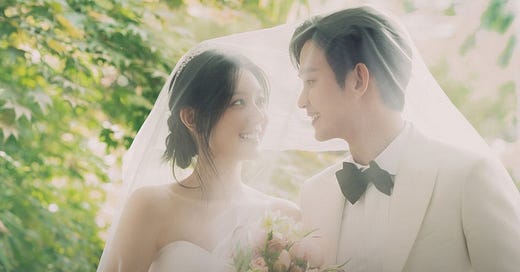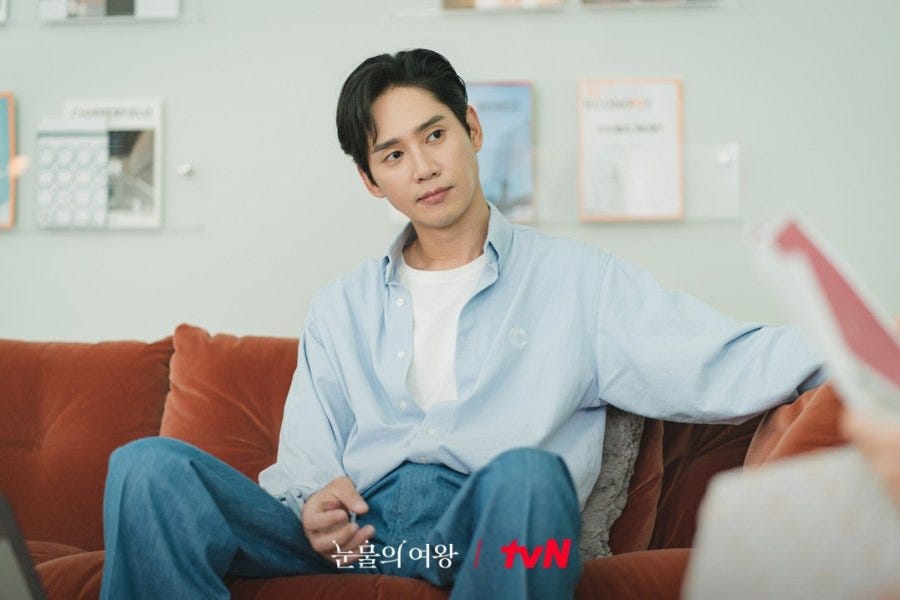Early last week I caught a clip of Kim Soo-hyun killing a rampaging boar with a hunting rifle to protect Kim Ji-won. It piqued my curiosity at once and in one afternoon I binge-watched 3 episodes of Queen of Tears. The drama grabbed my attention within the first few minutes. By the end of the first episode I knew that I had happened upon a gem — a discovery confirmed by subsequent episodes: A K drama to finally pull me out of my douyin drama watching rut. Still it’s not that much of a leap because Queen of Tears share many melodramatic elements/tropes of a classic soap opera found in douyin stories but with superior production values.
Kim Soo-hyun makes a bit of a comeback as an intelligent and sensitive lawyer who falls for the daughter (Kim Ji-won) of a large conglomerate some years earlier while she interns at the office where he works. His protective instincts are aroused when he observes her reckless ways. When her identity comes to light, he is Cinderella sprinting away from the ball back to his rural hometown and she comes for him in a helicopter no less. It is hailed the union of a century. A fairytale wedding. He is set to have his happily-ever-after. But for reasons unclear in these early episodes, the titular character and her consort are hardly ever happy. In fact Baek Hyun-woo wants out yesterday. The perfect son-in-law feels stifled and trapped by this dysfunctional chaebol family. He’s too good at what he does which usually means cleaning up after his troublesome in-laws. As someone puts it aptly, “he’s more of a butler than a son-in-law”. Three generations of Hongs living under one roof bicker endlessly and their intra-tribal animosity leave the door open (quite literally too) to external threats. This is a family that needs saving — first from themselves and then from malevolent forces that are eager to feed off the carcass of hostility for whatever ends they have in mind. Park Sung-hoon’s Yoon Eun-seong is one such insidious influence. His psychopathy hovers in the background as a dark cloud on an already bleak landscape. He’s a wolf in sheepskin. In fact he’s the wolf in the story of the three little pigs as he tries to ingratiate himself with the Hongs but Kim Ji-won’s Hong Hae-in in particular. Right out of the blocks he’s set up as a foil to Hyun-woo at the opposite end of the spectrum. He may look like a prince but in reality is a beast that must be slayed. And what about Lee Mi-sook’s character, grandpa Kim Gab-soo’s girlfriend? What is she up to adding fuel to fire widening divisions in that family?
Like all stories of this kind the drama presents itself as a fairytale. Cinderella is referenced early on but the Cinderella trope is inadequate to the task. That particular story unfolds in flashbacks. After only having seen 3 episodes I’m inclined to categorize it as a Sleeping Beauty story. It’s not battle that I would die for of course. It is fascinating that in the original Perrault version there are actually three parts to the story. Disney left out part three for obvious reasons and turned the angry fairy into a dragon. In part three, the prince who awakens Sleeping Beauty has become king and gone to war leaving his wife and two children in the precarious hands of his queen mother who is an ogress. In her son’s absence she gets cravings for human flesh so her daughter-in-law and grandchildren become the objects of her bloodlust. The taboo in the narrative makes a point. Evil and danger lurks about. It’s often much closer to home than one imagines. While the husband is off fighting wars, a much more present and pressing existential threat emerges in the home.
Like all chaebol dramas, the fabulously wealthy are depicted as royalty. The canary in a gilded cage Hyun-woo wants a divorce. He and Hae-in live separate lives in the Hong residence and the work he does for his in-laws is soul destroying. But none of his lawyer friends are willing to lend a hand to rescue him out of his predicament because it would mean going up against the royal family. Then as he takes a deep breath and approaches her with divorce papers, Hae-in gives him the bad news. She’s been afflicted with a rare incurable condition and is not expected to live for longer than 3 more months. For a man who’s been shackled in prison, it’s the prospect of freedom at last.
Queen of Tears is many things and perhaps more in days to come. Where it resonates is how it handles the issue of marriage — with humour, warmth and even wisdom. More than anything else, at its core is a wonderfully written morality tale about marriage. The humour stems from the relatability of the situations and the psychological insights are pitch perfect. A young man and a woman loved each other enough to cross class barriers. So what happened? No doubt they had stars in the eyes as they sauntered towards the altar. For one, he didn’t just marry her… he married her entire family and all their baggage — lock, stock and barrel. Aside from that something else must have happened to see them both sleeping in different rooms. Despite the venom and all the jubilation over the prospect of being free after three months, it’s obvious that Hyun-woo’s protective posture towards Hae-in is very much alive and well. Has their marriage become the sham they both believe it to be? Can nothing be salvaged from the wreck? There’s a strong sense in the narrative that Hyun-woo’s “mission” in this divided household has only really just begun. At the very time he wants to leave, someone is trying to kill the wife he has come to resent. It appears that there’s something left in that empty tank that can’t bear to see her hurt.
So it’s back to Sleeping Beauty. The analogies fit broadly. Can the perceived outsider, the son-in-law who wants to leave be the one to cut through the weeds and bramble to awaken the family from their complacent slumber? It seems unfair that he should be called to such a task after already giving so much of himself to a bunch of ingrates. And yet it may be that those ingrates are not beyond redemption.
If you enjoyed reading this post, feel free to leave a comment, share, like or subscribe for more content of this sort.





"Queen of Tears is many things and perhaps more in days to come. Where it resonates is how it handles the issue of marriage — with humour, warmth and even wisdom."
This. Very well said. I see bits of my marriage here--though I'm not rich and have been with my husband for much more than 3 years. This is a very smart drama about how people who love each other drift apart and even develop contempt for each other.